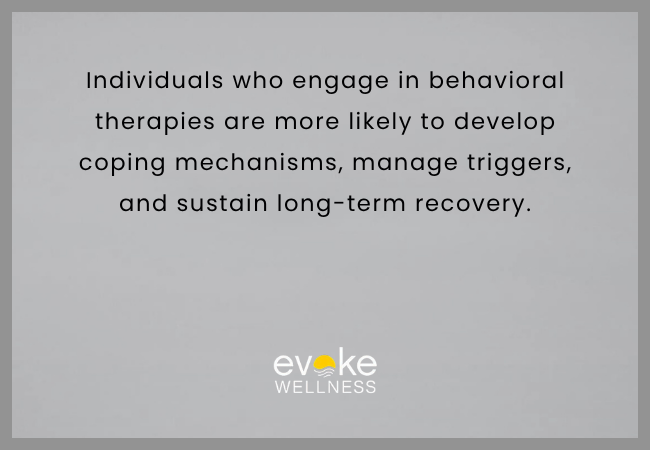Behavioral health and mental health are terms that are often used interchangeably, yet they carry important distinctions that matter deeply—especially when seeking the right form of treatment. The difference between them isn’t just a matter of semantics; it shapes the care you receive, the professionals who support you, and the tools used in your healing journey.
At Evoke Wellness Ohio, we know that a nuanced understanding of these terms empowers individuals and families to make better decisions about their wellness. Whether you’re exploring care for yourself or a loved one, recognizing these differences is a key first step toward recovery and lasting change.
Understanding Mental Health: Emotions, Thought Patterns, and Disorders
Mental health focuses primarily on a person’s emotional and psychological state. It encompasses how we think, feel, and behave—and how we handle stress, relate to others, and make decisions. Mental health conditions are diagnosable psychiatric disorders such as depression, anxiety disorders, bipolar disorder, schizophrenia, and post-traumatic stress disorder (PTSD).
These conditions affect cognition and mood, which can result in disruptions to daily life and relationships. When people speak about struggling with mental health, they’re often referring to overwhelming thoughts or emotional states that make it hard to function or find peace. Proper diagnosis and evidence-based treatments like cognitive-behavioral therapy (CBT), medication management, and counseling are key components of treating mental health issues effectively.
What Is Behavioral Health?
Behavioral health is a broader term that encompasses mental health but also includes how behaviors—both healthy and harmful—impact well-being. It includes mental illnesses as well as behaviors like eating habits, substance use, sleep routines, physical activity, and coping strategies. Behavioral health treatment examines how these behaviors interact with emotional and psychological functioning.
For instance, someone may not meet the criteria for a specific mental health disorder but may still struggle with self-destructive habits like excessive drinking, avoiding responsibilities, or chronic stress due to poor coping skills. Behavioral health focuses on modifying those behaviors to improve overall wellness. This often includes lifestyle interventions, behavioral therapy, and habit changes supported by therapeutic interventions.
Why the Distinction Matters
Understanding the distinction helps individuals access the right kind of care. While mental health focuses on managing and treating diagnosable psychiatric conditions, behavioral health includes a broader focus on how lifestyle, habits, and decisions affect one’s emotional and mental state.
The two intersect often. A person with depression (a mental health issue) may begin isolating themselves, neglecting hygiene, or using substances to cope (behavioral health concerns). These overlapping challenges require integrated care—something Evoke Wellness Ohio specializes in.
For example, someone dealing with long-term anxiety may also experience insomnia, develop unhealthy eating habits, or use alcohol to self-medicate. Their treatment plan should address both the psychiatric root and the related behavioral patterns, offering more holistic and sustainable recovery outcomes.
How Behavioral Health Affects Physical Health
Another important reason to distinguish behavioral from mental health is the impact on physical wellness. Behavioral health disorders can manifest in physical symptoms, including chronic fatigue, gastrointestinal problems, headaches, and weakened immune response.
For example, chronic stress can lead to hypertension and cardiovascular issues. Unmanaged substance use may result in liver or kidney damage. Ignoring these behaviors may eventually worsen both emotional and physical states. On the other hand, focusing on behavioral health allows for intervention before these physical symptoms escalate into chronic health problems.
This holistic focus is what makes behavioral health programs more comprehensive. It’s not just about identifying the problem, but understanding and healing the patterns behind it.
The Role of Integrated Treatment Approaches
Effective recovery plans treat both the emotional and behavioral components of a person’s life. That’s why modern behavioral healthcare facilities prioritize integrated treatment models. At Evoke Wellness Ohio, our programs don’t just diagnose conditions—we help patients develop healthier routines, form supportive relationships, and build long-term resilience.
Whether it’s therapy for anxiety, coaching around healthy decision-making, or substance use intervention, an integrated approach combines clinical, behavioral, and medical strategies to meet patients where they are.
A person attending a Residential Treatment Center in Ohio, for example, may benefit from structured living, individual and group therapy, physical wellness activities, and holistic care such as mindfulness or nutritional counseling. This full-spectrum model creates a safe space for lasting behavioral change and mental clarity.
Addressing Co-Occurring Conditions
Behavioral health also considers co-occurring disorders, which are incredibly common. Mental health conditions frequently overlap with substance use or physical health issues, complicating treatment. An individual with PTSD may also experience alcohol dependence; someone with anxiety may turn to prescription drugs for relief.
These dual challenges require specialized intervention. A Dual Diagnosis Treatment Program in Ohio can effectively treat both conditions at the same time, providing not just symptom relief but also the behavioral skills needed to manage life without returning to old patterns.
By addressing mental and behavioral health together, patients are given tools for accountability, emotion regulation, communication, and decision-making—all essential for long-term recovery.
When to Seek Behavioral Health Help
Behavioral health challenges often go unnoticed because they don’t always appear as dramatic as acute psychiatric episodes. However, there are clear signs that a person may benefit from behavioral health support:
-
Difficulty managing daily responsibilities
-
Increased substance use or risky behavior
-
Persistent feelings of hopelessness, guilt, or irritability
-
Poor sleep or changes in appetite
-
Avoidance of social interaction
-
Trouble regulating emotions or responses
If these signs are disrupting your life or relationships, seeking professional care isn’t just important—it’s necessary.
That care might begin with therapy or outpatient counseling. However, more structured programs are often needed for lasting results.
Programs such as Addiction Treatment Programs in Ohio offer comprehensive services that combine psychological, behavioral, and medical support. These programs ensure that patients can explore root causes while actively working to change their daily routines and choices.
Behavioral Health and Medical Detox
One of the first steps in many behavioral health journeys—especially when substance use is involved—is detoxification. This critical phase clears the body of harmful substances under medical supervision and allows for a safe transition into deeper therapeutic work.
At a Medical Detox Center in Ohio, patients receive round-the-clock monitoring, withdrawal management, and early-stage emotional support. Once the body begins to heal, deeper therapy becomes more effective. Medical detox is often the foundation upon which behavioral transformation is built.
Skipping this stage can result in relapse or worsened symptoms, especially if withdrawal is attempted alone. That’s why partnering with a licensed and professional treatment center is essential.
The Power of Inpatient Care
While outpatient care can be effective, inpatient programs offer an immersive healing experience. A structured, supportive environment gives individuals time and space to heal without the triggers or distractions of everyday life.
An Intensive Inpatient Treatment Program in Ohio provides a more hands-on approach with constant clinical supervision, therapy, wellness activities, and peer support. These programs typically last several weeks and help patients reset both mentally and behaviorally. They are ideal for individuals with severe or persistent challenges who need a stable foundation before transitioning into outpatient care.
Why Choose Us?
At Evoke Wellness Ohio, our approach to behavioral health is grounded in compassion, clinical excellence, and long-term support. We recognize that healing doesn’t just come from medication or talk therapy—it’s built through healthy habits, community, accountability, and skill-building.
Our facility also operates as a Mental Health Treatment Center in Ohio, offering a full range of services designed to meet individual needs. Whether you need detox, therapy, residential care, or dual diagnosis support, our team is here to walk beside you every step of the way.
We combine evidence-based practices with compassionate care to create a safe, healing environment where growth is always possible.
Conclusion
Understanding the difference between behavioral and mental health is more than a vocabulary lesson—it’s a blueprint for healing. When we treat not just the symptoms but also the behaviors and beliefs that shape a person’s life, recovery becomes real and sustainable.
If you or a loved one is struggling with emotional or behavioral challenges, don’t wait. The help you need is available. Contact Evoke Wellness Ohio today at 866-430-9267 to begin your journey toward whole-person healing and lasting change.
Frequently Asked Questions (FAQs)
What is the main difference between behavioral health and mental health?
Behavioral health is a broader term that includes mental health and how habits and behaviors affect overall well-being. Mental health refers specifically to emotional and psychological disorders.
Can a person have behavioral health issues without a mental illness?
Yes. For example, substance misuse or poor lifestyle habits can impact wellness without meeting criteria for a mental illness. Behavioral health treatment addresses these patterns.
How do I know if I need behavioral health support?
Signs include ongoing stress, substance use, difficulty managing emotions, or changes in sleep, appetite, or behavior. If daily life is impacted, professional support is recommended.
What types of treatment are used in behavioral health care?
Treatment may include individual therapy, group therapy, medication, detox, lifestyle coaching, and inpatient or outpatient care depending on individual needs.
Is behavioral health treatment available in residential settings?
Yes. Residential programs provide structured, immersive care that supports behavioral and mental wellness. Evoke Wellness Ohio offers comprehensive residential services.



